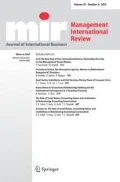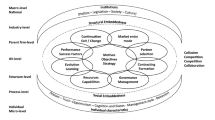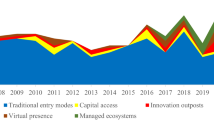Abstract
-
Reviewing the International Business (IB) literature on intra-firm competition as well as the more extensive literature on subsidiary mandate change, the paper uncovers that both literature streams so far pay rather little systematic attention to the political dimension of intra-firm competition.
-
Taking a micro-political perspective, an alternative framework is developed that helps to identify key actors, their behavioral rationales and the contextual conditions that inform such rationales in intra-firm competition.
-
Specifically, we argue that subsidiary managers’ ability to mobilize resources (based on their resource exchange relationships) within and outside the multinational corporation (MNC) and their willingness to employ these in favor of the subsidiary (based on their strategic orientation) form an important strategic asset in intra-firm competition.
-
Further, we argue that the subsidiary manager’s resource exchange relationships and their strategic orientation—in combination understood as different resource mobilization strategies—are informed by their career path, position and aspiration.



Similar content being viewed by others
References
Adler, P. S., & Kwon, S.-W. (2002). Social capital: Prospects for a new concept. Academy of Management Review, 27(1), 17–40.
Al-Husan, B. F., & James, P. (2003). Cultural control and multinationals: the case of privatized Jordanian companies. International Journal of Human Resource Management, 14(7), 1284–1295.
Andersson, U., & Holm, U. (2009). Managing the contemporary multinational: the role of headquarters. Cheltenham: Edward Elgar.
Andersson, U., Forsgen, M., & Holm, U. (2007). Balancing subsidiary influence in the federative MNC: a business network view. Journal of International Business Studies, 38(5), 802–818.
Arthur, M. B., & Rousseau, D. M. (1996). The boundaryless career: a new employment principle for a new organizational era. Oxford: Oxford University Press.
Astley, W. G., & Zajac, E. J. (1990). Beyond dyadic exchange: functional interdependence and sub-unit power. Organisation Studies, 11(4), 481–501.
Astley, W. G., & Zajac, E. J. (1991). Intraorganizational power and organizational design: reconciling rational and coalitional models of organization. Organization Science, 2(4), 399–411.
Au, K. Y., & Fukuda, J. (2002). Boundary spanning behaviors of expatriates. Journal of World Business, 37(4), 285–296.
Bachmann, R. (2001). Trust, power and control in trans-organisational relations. Organization Studies, 22(2), 337–365.
Banai, M., & Harry, W. (2005). Boundaryless global careers. The international itinerants. International Studies of Management and Organisation, 34(3), 96–120.
Banai, M., & Reisel, W. D. (1993). Expatriate managers’ loyalty to the MNC: myth or reality? An exploratory study. Journal of International Business Studies, 24(2), 233–248.
Becker-Ritterspach, F. (2006). The social constitution of knowledge integration in MNEs: a theoretical framework. Journal of International Management, 12(3), 358–377.
Becker-Ritterspach, F., & Dörrenbächer, C. (2009). Intra-firm competition in multinational corporations: Towards a political framework. Competition and Change, 13(3), 199–213.
Birkinshaw, J. (1996). How multinational subsidiary mandates are gained and lost. Journal of International Business Studies, 27(3), 467–495.
Birkinshaw, J. (2000). Entrepreneurship in the global firm. London: Sage.
Birkinshaw, J. M., & Hood, N. (1998). Multinational subsidiary evolution: Capability and charter change in foreign-owned subsidiary companies. Academy of Management Review, 23(4), 773–795.
Birkinshaw, J., & Lingblad, M. (2005). Intra-firm competition and charter evolution in the multi-business firm. Organization Science, 16(6), 674–686.
Birkinshaw, J., & Morrison, A. J. (1995). Configurations of strategy and structure in subsidiaries of multinational corporations. Journal of International Business Studies, 26(4), 729–753.
Birkinshaw, J., & Ridderstråle, J. (1999). Fighting the corporate immune system: A process study of subsidiary initiatives in multinational corporations. International Business Review, 8(2), 149–180.
Black, J. S., & Gregersen, H. B. (1992). Serving two masters: Managing the dual allegiance of expatriate employees. Sloan Management Review, 33(4), 61–71.
Blazejewski, S. (2009). Actors’ interests and local contexts in intrafirm conflict: The 2004 GM/Opel crisis. Competition & Change, 13(3), 229–250.
Bouquet, C., & Birkinshaw, J. (2008a). Weight versus voice: How foreign subsidiaries gain the attention of headquarters. Academy of Management Journal, 51(3), 577–601.
Bouquet, C., & Birkinshaw, J. (2008b). Managing power in the multinational corporation: How low-power actors gain influence. Journal of Management, 34(3), 477–508.
Brandenburger, A. M., & Nalebuff, B. J. (1995). The right game: Use game theory to shape strategy. Harvard Business Review, 73(4), 57–71.
Burgelman, R. (1983). A process model of corporate venturing in the diversified major firm. Administrative Science Quarterly, 28(2), 223–244.
Burns, T. (1961). Micropolitics: Mechanisms of institutional change. Administrative Science Quarterly, 6(3), 257–281.
Cantwell, J., & Mudambi, R. (2005). MNE competence-creating subsidiary mandate. Strategic Management Journal, 26(12), 1109–1128.
Cappellen, T., & Jannsens, M. (2005). Career paths of global managers: Towards future research. Journal of World Business, 40(4), 348–360.
Cerrato, D. (2006). The multinational enterprise as an internal market System. International Business Review, 15(3), 253–277.
Chini, T., Ambos, B., & Wehle, K. (2005). The headquarters-subsidiaries trench: Tracing perception gaps within the multinational corporation. European Management Journal, 23(2), 145–153.
Clegg, S. R., Courpasson, D., & Phillips, N. (2006). Power and Organizations. London: Sage.
Crozier, M. (1964). Le Monde des Employés de Bureau. Paris: Editions du Seuil.
Crozier, M., & Friedberg, E. (1977). L’Acteur et le Système. Paris: Le Seuil.
Crozier, M., & Friedberg, E. (1980). Actors and systems: The politics of collective action. Chicago: University of Chicago Press.
Cyert, R. M., & March, J. G. (1963). A behavioral theory of the firm. Englewood Cliffs: Prentice-Hall.
Dahl, R. (1957). The concept of power. Behavioral Science, 2(3), 201–215.
Dörrenbächer, C., & Geppert, M. (2007). The impact of foreign subsidiary manager’s socio-political positioning on career choices and their subsequent strategizing: Evidence from German-owned subsidiaries in France. In M. Ozbilgin & A. Malach Pines (Eds.), Career choice in management and entrepreneurship: A research companion (pp. 240–257). Aldershot: Edward Elgar.
Dörrenbächer, C., & Geppert, M. (2009). A micro-political perspective on subsidiary initiative-taking: Evidence from German-owned subsidiaries in France. European Management Journal, 27(2), 100–112.
Dörrenbächer, C., & Geppert, M. (Eds). (2011). Politics and power in the multinational corporation. The role of institutions, interests and identities. Cambridge: Cambridge University Press.
Edwards, M. R. (2005). Organizational identification: a conceptual and operational review. International Journal of Management Reviews, 7(4), 207–230.
Edwards, M. R., & Peccei, R. (2007). Organizational identification: Development and testing of a conceptually grounded measure. European Journal of Work and Organizational Psychology, 16(1), 25–57.
Etzioni, A. (1964). Modern organizations. Englewood Cliffs: Prentice-Hall.
Ferner, A., & Edwards, P. (1995). Power and the diffusion of organizational change within multinational enterprises. European Journal of Industrial Relations, 1(2), 229–257.
Flecker, J. (2000). Transnationale Unternehmen und die Macht des Ortes. In C. Dörrenbächer & D. Plehwe (Eds.), Grenzenlose Kontrolle? Organisatorischer Wandel und Politische Macht multinationaler Unternehmen (pp. 45–70). Berlin: Edition Sigma.
Fligstein, N. (1990). The transformation of corporate control. Cambridge: Harvard University Press.
Forsgren, M. (2008). Theories of the multinational firm: A multidimensional creature in the global economy. Cheltenham: Edward Elgar.
Forsgren, M., Holm, U., & Johanson, J. (2005). Managing the embedded multinational: A business network view. Cheltenham: Edward Elgar.
French, J. P. R. Jr., & Raven, B. (1960). The bases of social power. In D. Cartwright & A. Zander (Eds.), Group dynamics (pp. 607–623). New York: Harper and Row.
Friedberg, E. (1992). Zur Politologie von Organizationen. In W. Küpper & G. Ortmann (Eds.), Mikropolitik, Rationalität, Macht und Spiele in Organisationen (pp. 39–52). Opladen: Westdeutscher Verlag.
Galunic, D. C., & Eisenhardt, K. M. (1996). The evolution of intracorporate domains: Divisional charter losses in high-technology multidivisional corporations. Organization Science, 7(3), 255–282.
Geppert, M., & Clark, E. (2003). Knowledge and learning in transnational ventures: An actor-centred approach. Management Decision, 41(5), 433–442.
Geppert, M., & Matten, D. (2006). Institutional influences on manufacturing organization in multinational corporations: The ‘Cherrypicking’ approach. Organization Studies, 27(4), 491–515.
Giddens, A. (1984). The constitution of society, outline of the structuration theory. Berkley: University of California Press.
Gregersen, H. B., & Black, J. S. (1992). Antecedents to commitment to a parent company and a foreign operation. Academy of Management Journal, 35(1), 65–90.
Gupta, A. K., & Govindarajan, V. (2000). Knowledge flows within multinational corporations. Strategic Management Journal, 21(4), 473–496.
Harvey, M. G., Novicevic, M. M., & Speier, C. (1999). Inpatriate managers: How to increase the probability of success. Human Resource Management Review, 9(1), 151–181.
Harzing, A. W. (1999). Managing the multinationals: An international study of control mechanisms. Cheltenham: Edward Elgar.
Harzing, A.-W. K. (2001). Of bears, bumble-bees and spiders: The role of expatriates in controlling foreign subsidiaries. Journal of World Business, 36(4), 366–379.
Herrmann, P., & Werbel, J. D. (2007). Promotability of host-country nationals: A cross-cultural study. British Journal of Management, 18(3), 281–293.
Hickson, D. J., Hinings, C. R., Lee, C. A., Schneck, R. E., & Pennings, J. M. (1971). Strategic contingencies’ theory of intraorganizational power. Administrative Science Quarterly, 16(2), 216–229.
Hill, C. W. L., & Jones, T. M. (1992). Stakeholder-agency theory. Journal of Management Studies, 29(2), 131–154.
Hill, C. W., Hitt, M. R., & Hoskisson, R. E. (1992). Cooperative vs. competitive structures in related and unrelated diversified firms. Organization Science, 3(4), 501–521.
Humes, S. (1993). Managing the multinational: Confronting the global-local dilemma. New York: Prentice-Hall.
Inkpen, A., & Tsang, E. W. K. (2005). Social capital networks, and knowledge transfer. Academy of Management Review, 30(1), 146–165.
Johnston, S. (2005). Headquarters and subsidiaries in multinational corporations. Strategies, tasks and coordination. Houndsmills: Palgave Macmillan.
Khoja, F. (2008). Is sibling rivalry good or bad for high technology organizations?. Journal of High Technology Management Research, 19(1), 11–20.
Kostova, T., & Roth, K. (2003). Social capital in multinational corporations and a micro-macro model of its formation. The Academy of Management Review, 28(2), 297–317.
Kristensen, P. H., & Zeitlin, J. (2005). Local players in global games. The strategic constitution of a multinational corporation. Oxford: Oxford University Press.
Lazarova, M., & Taylor, S. (2009). Boundaryless careers, social capital, and knowledge management: Implications for organizational performance. Journal of Organizational Behavior, 30(1), 119–139.
Leana, C. R., & Van Buren, H. J. (1999). Organizational social capital and employment practices. Academy of Management Review, 24(3), 538–555.
Ling, Y., Floyd, S., & Baldridge, D. (2005). Toward a model of issue selling by subsidiary managers in multinational organizations. Journal of International Business Studies, 36(6), 637–654.
Loveridge, R. (2006). Embedding the multinational enterprise: The micro-processes of institutionalisation in developing economies. In M. Geppert & M. Mayer (Eds.), Global, national and local practices in multinational companies (pp. 189–220). Houndsmill: Palgrave Macmillan.
Lukes, S. (2005). Power: a radical view (2nd ed.). Basingstoke: Palgrave.
Luo, Y. (2005). Toward coopetition within a multinational enterprise: A perspective from foreign subsidiaries. Journal of World Business, 40(1), 71–90.
Mäkelä, K. (2007). Knowledge sharing through expatriate relationships: A social capital perspective. International Studies in Management and Organization, 37(3), 108–126.
Mäkelä, K., & Suutari, V. (2009). Global careers: A social capital paradox. The International Journal of Human Resource Management, 20(5), 992–1008.
March, J. G. (1962). The business firm as a political coalition. The Journal of Politics, 24(4), 662–678.
Mintzberg, H. (1983). Power in organizations. Englewood Cliffs: Prentice-Hall.
Mitchell, R. K., Agle, B. R., & Wood, D. J. (1997). Toward a theory of stakeholder identification and salience: Defining the principle of who and what really counts. Academy of Management Review, 22(4), 853–886.
Moore, F. (2006). Strategy, power and negotiation: Social control and expatriate managers in a German multinational corporation. International Journal of Human Resource Management, 17(3), 399–413.
Morgan, G., & Kristensen, P. H. (2006). The contested space of multinationals: Varieties of institutionalism, varieties of capitalism. Human Relations, 59(11), 1467–1490.
Mudambi, R., & Navarra, P. (2004a). Is knowledge power? Knowledge flows, subsidiary power and rent-seeking within MNCs. Journal of International Business Studies, 35(5), 385–406.
Mudambi, R., & Navarra, P. (2004b). Divisional power, intra-firm bargaining and rent-seeking behavior in multidivisional corporations. Economics Bulletin, 13(4), 1–10.
Nahapiet, J., & Ghoshal, S. (1998). Social capital, intellectual capital and the organizational advantage. Academy of Management Review, 23(2), 242–266.
Nohria, N., & Ghoshal. S. (1997). The differentiated network: Organizing multinational corporations for value creation. San Francisco: Jossey-Bass.
Noorderhaven, N. G., & Harzing, A. W. K. (2009). Knowledge-sharing and social interaction within MNEs. Journal of International Business Studies, 40(5), 719–741.
O’Reilly III, C., & Chatman, J. (1986). Organizational commitment and psychological attachment: The effects of compliance, identification, and internationalization on prosocial behavior. Journal of Applied Psychology, 71(3), 492–499.
Padula, G., & Dagnini, G. B. (2007). Untangling the rise of coopetition. The intrusion of cooperative game structure. International Studies of Management and Organisation, 37(2), 32–52.
Pahl, J. M., & Roth, K. (1993). Managing the headquarters-foreign subsidiary relationship: The roles of strategy, conflict, and integration. The International Journal of Conflict Management, 4(2), 139–165.
Perlmutter, H. V. (1969). The tortuous evolution of the multinational corporation. Columbia Journal of World Business, 4(1), 9–18.
Peterson, R. B., Napier, N., & Shim, W. S. (1996). Expatriate management: The differential role of national multinational corporation ownership. The International Executive, 38(4), 543–562.
Peterson, R. B., Napier, N., & Shim, W. S. (2000). Expatriate management: A comparison of MNCs across four parent countries. Thunderbird International Business Review, 42(2), 145–166.
Petit, T. A. (1975). Fundamentals of management coordination: Supervisors, middle managers, and executives. New York: Wiley.
Pfeffer, J. (1981). Power in organizations. New York: Harper Business.
Pfeffer, J., & Salancik, G. R. (1974). Organizational decision making as a political process: The case of a University Budget. Administrative Science Quarterly, 19(2), 135–151.
Pfeffer, J., & Salancik, G. R. (1978). The external control of organization. New York: Harper and Row.
Phelps, N., & Fuller, C. (2000). Multinationals, intracorporate competition and regional development. Economic Geography, 76(3), 224–243.
Piotti, G. (2009). Cost reduction through relocation or the construction of “myths” in discourse. Competition & Change, 13(3), 308–329.
Raider, H. J., & Burt, R. S. (1996). Boundaryless careers and social capital. In M. B. Arthur & D. M. Rousseau (Eds.), The boundaryless career: A new employment principle for a new organizational era (pp. 187–200). Oxford: Oxford University Press.
Reade, C. (2001). Dual identification in multinational corporations: Local managers and their psychological attachment to the subsidiary versus the global organization. International Journal of Human Resource Management, 12(3), 405–424.
Reade, C. (2003). Going the extra mile: Local managers and global effort. Journal of Management Psychology, 18(3), 208–228.
Reiche, B. S., Harzing, A.-W., & Kraimer, M. L. (2009). The role of international assignees’ social capital in creating inter-unit intellectual capital: A cross-level model. Journal of International Business Studies, 40(3), 509–529.
Riketta, M. (2005). Organizational identification: A meta-analysis. Journal of Vocational Behavior, 66(2), 358–384.
Roth, K., & Nigh, D. (1992). The effectiveness of headquarters-subsidiary relationships: The role of coordination, control and conflict. Journal of Business Research, 25(4), 277–301.
Ruigrok, W., Achtenhagen, L., Wagner, M., & Ruegg-Stürm, J. (2003). ABB: Beyond the global matrix towards the network multidivisional organization. In P. N. Gooderham (Ed.), International management: Cross-boundary challenges (pp. 64–86). Malden: Blackwell.
Schmid, S., & Machulik, M. (2006). What has Perlmutter really written? A comprehensive analysis of the EPRG concept, ESCP EAP Working Paper, no. 16.
Schmid, S., & Maurer, J. (2008). Relationships between MNC subsidiaries—towards a classification scheme, ESCP EAP Working Paper, no. 35.
Schmid, S., & Schurig, A. (2003). The development of critical capabilities in foreign subsidiaries: Disentangling the role of the subsidiary’s business network. International Business Review, 12(6), 755–782.
Steward, R. (1976). Contrasts in management—a study of different types of managers’ jobs: Their demands and choices. Maidenhead: McGraw-Hill.
Stopford, J., & Strange, S. (1991). Rival states, rival firms. Competition for world market shares. Cambridge: Cambridge University Press.
Sturges, J., Guest, D., Conway, N., & Mackenzie Davey, K. (2002). A longitudinal study of the relationship between career management and organizational commitment among graduates in the first ten years at work. Journal of Organizational Behavior, 23(6), 731–748.
Suutari, V. (2003). Global managers: career orientation, career tracks, life-style implications, and career commitment. Journal of Managerial Psychology, 18(3), 185–207.
Thye, S. R. (2000). A status value theory of power in exchange relations. American Sociological Review, 65(3), 407–432.
Tsai, W. (2002). Social structure of “coopetition” within a multiunit organization: coordination, competition, and intraorganizational knowledge sharing. Organization Science, 13(2), 179–190.
Vora, D., & Kostova, T. (2007). A model of dual organizational identification in the context of the multinational enterprise. Journal of Organizational Behavior, 28(3), 327–350.
Vora, D., Kostova, T., & Roth, K. (2007). Roles of subsidiary managers in multinational corporations: the effect of dual organizational identification. Management International Review, 47(4), 595–620.
Walley, K. (2007). Competition: an introduction to the subject and an agenda for research. International Studies of Management and Organization, 37(2), 11–13.
Weber, M. (1947). The theory of social and economic organization. New York: Free Press.
White, R. E., & Poynter, T. A. (1984). Strategies for foreign-owned subsidiaries in Canada. Business Quarterly, 49(2), 59–69.
Wortmann, M. (2008). Komplex und global. Strategien und Strukturen multinationaler Unternehmen. Wiesbaden: VS Verlag für Sozialwissenschaften.
Author information
Authors and Affiliations
Corresponding author
Rights and permissions
About this article
Cite this article
Becker-Ritterspach, F., Dörrenbächer, C. An Organizational Politics Perspective on Intra-firm Competition in Multinational Corporations. Manag Int Rev 51, 533–559 (2011). https://doi.org/10.1007/s11575-011-0083-2
Received:
Revised:
Accepted:
Published:
Issue Date:
DOI: https://doi.org/10.1007/s11575-011-0083-2




